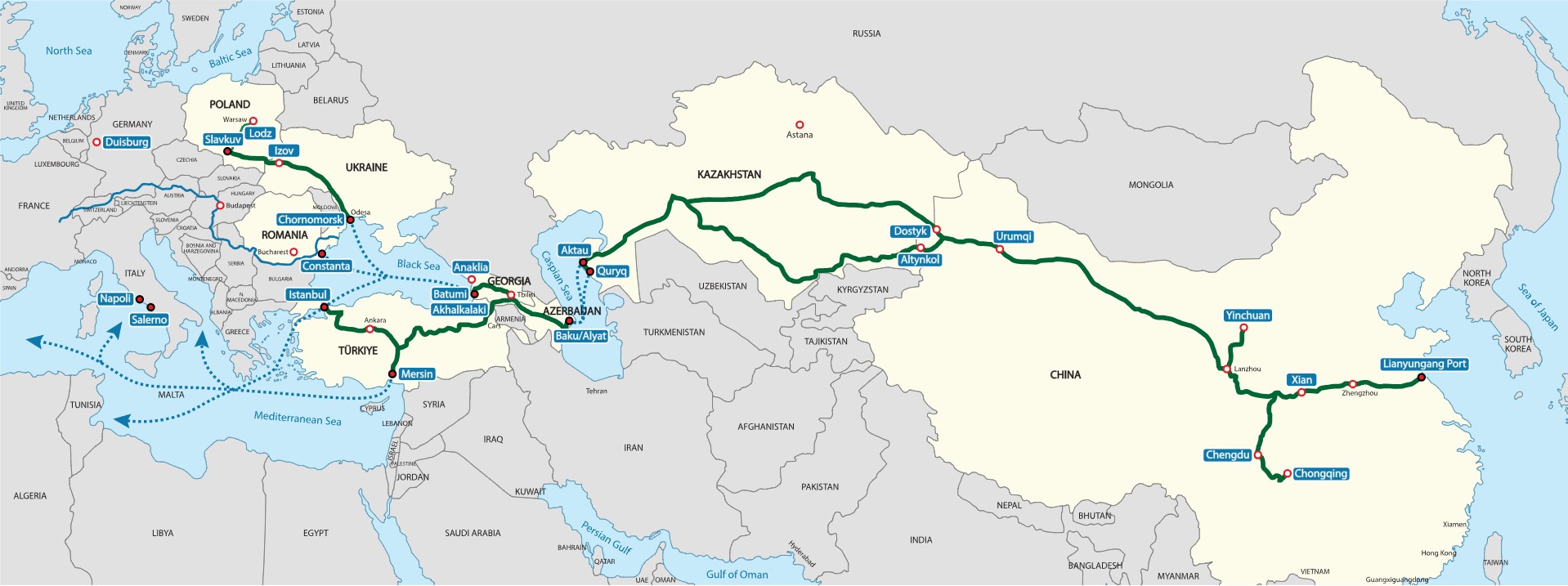The Significance and Potential of the Trans-Caspian International Corridor for OTS Member States

The Trans-Caspian International Transport Corridor, or the "Middle Corridor," is currently emerging as one of the most promising and strategic routes between Asia and Europe. For the member states of the Organization of Turkic States (OTS), the importance of this corridor is invaluable not only in terms of transit opportunities but also in promoting economic integration, accelerating international trade flows, and modernizing transport and logistics infrastructure.
According to the World Bank, the Asian Development Bank, and the European Commission, by 2030 the volume of cargo transported via the Middle Corridor is expected to reach 10 – 11 million tons per year. Particularly in the context of global geopolitical changes after 2022, the "Middle Corridor" has gained relevance as an alternative to the Northern Route.
In recent years, significant projects have been implemented by OTS countries to develop the corridor. Kazakhstan’s ports of Aktau and Kuryk are being expanded and transformed into multimodal transport hubs. The capacity of the Baku International Sea Port in Azerbaijan is planned to be increased to 25 million tons by 2025. In Turkey, cargo flows through the Baku-Tbilisi-Kars railway and the Marmaray Tunnel are seamlessly connected with Europe. In Uzbekistan, logistics centers and international railway links are being expanded, and practical work has begun on the "China – Kyrgyzstan – Uzbekistan" railway project.
Experts believe that the "China – Kyrgyzstan – Uzbekistan" railway will become the shortest route from China to European and Middle Eastern countries, reducing the distance by 900 kilometers and cutting delivery time by 7–8 days.
In addition, Turkmenistan and Uzbekistan are striving to fully utilize the potential of the Turkmenbashi International Sea Port and the international multimodal route "Asia-Pacific Countries – China – Kyrgyzstan – Uzbekistan – Turkmenistan – Azerbaijan – Georgia – Europe" (CASCA+). In particular, discounts of up to 70% on rail transport along this route have been announced.
The concept "Turkic World Vision – 2040", adopted at the OTS summit in Istanbul in 2021, placed special emphasis on the development of the Middle Corridor. Priority tasks were identified as the harmonization of tariff policies, simplification of customs procedures, introduction of digital transport systems, and expansion of multimodal transport opportunities.
If in 2021 the first project of electronic permit exchange between Uzbekistan and Turkey was implemented via the E-permit digital platform, today electronic permit exchange has been introduced among all OTS member states.
Moreover, the Agreement on International Combined Transport between OTS Member States and the OTS Transport Connectivity Program, both adopted at the Samarkand summit in 2022, created the foundation for simplifying international combined transport procedures, including preliminary information exchange, accelerating and simplifying customs procedures, and introducing digital technologies into the transport process.
By the end of 2024, the volume of goods transported along the route through Kazakhstan and Azerbaijan’s ports increased by 20% compared to the previous year, reaching 3.3 million tons.
Despite positive growth dynamics, certain challenges remain along the route, requiring coordinated efforts to overcome them. In particular, issues persist with meeting delivery deadlines and capacity limitations along the corridor. Another major challenge in recent years has been the shallowing of the Caspian Sea, which increases transportation costs due to the inability to fully load ships.
In these conditions, coordinated investments in the creation of adequate infrastructure along existing transport routes are of particular importance. The European Union has included this corridor in its "Global Gateway" initiative, while the Asian Development Bank has allocated an investment package worth USD 4 billion since 2001 to support corridor infrastructure.
In January 2024, the European Union announced the mobilization of EUR 10 billion to support Central Asia in the development of the Middle Corridor, including reducing cargo delivery times to 15 days. In April 2025, an expanded investment package of EUR 12 billion was presented in Samarkand, covering four priority areas, one of which is the development of the Trans-Caspian transport route.
In conclusion, the Trans-Caspian International Transport Corridor holds exceptional importance for OTS member states not only as a transport and communication route but also as a strategic geo-economic platform. It enables the region to become a central link in the Eurasian trade chain, attract investments, create new jobs, and strengthen tourism and cultural exchange.
Undoubtedly, the sustainable development of the Trans-Caspian route will enhance the economic and political power of the Turkic world and transform it into one of the most important centers on the global transport map.
Chief Specialist of the Center for the Study of Transport Issues
Sh. Shikhnazarov